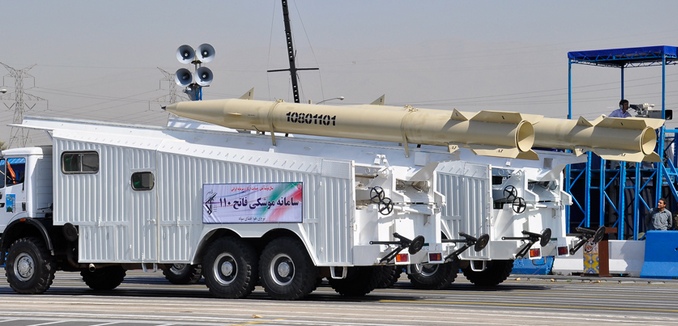The strike last Friday on a military airport near Damascus was likely the latest salvo in Israel’s attempt to prevent Hezbollah from obtaining highly-accurate Iranian surface-to-surface missiles, Ynet military analyst Ron Ben Yishai wrote Tuesday.
The targeted airport is a known drop-off point for missiles delivered from Iran by cargo planes, Ben Yishai explained. He wrote that both Hezbollah leader Hassan Nasrallah and senior Iranian military officials recently acknowledged that the terror group was receiving missiles, possibly advanced GPS guided missiles, which “could reach central and even southern Israel and threaten most of the essential facilities and civilian and military airports in the State of Israel.”
The Iranian shipments likely included Fateh-110 or Fateh-111 missiles, and possibly even Zelzals, which have a range of 200-300 kilometers (125-186 miles) and have a warhead weighing 400 kilograms (880 pounds). Hezbollah has said that it would use its arsenal to target Israel’s defense ministry in Tel Aviv and other essential targets across Israel, which would be in the Zelzals’ range. Because of the accuracy of these missiles, which have a target radius of only a few meters, “Israel is interested in reducing the number of such missiles in Hezbollah’s possession” in order to reduce Hezbollah’s ability to hit strategic targets across Israel, Ben Yishai wrote.
Syrian opposition reports also claimed that there were strikes against targets on Mount Qasiun, overlooking Damascus. Such attacks would make sense because those areas likely house “missile depots and antiaircraft systems intended to serve Hezbollah’s aerial defense system,” Ben Yishai reported.
He also addressed Syrian claims that the attacks were carried out by Israeli planes that never entered Syrian airspace. This is credible, he wrote, because “very accurate air-to-surface missiles can be launched from distances of dozens and even hundreds of kilometers and hit the target at an accuracy of 1 or 2 meters.” By not entering Syrian airspace, Israel avoided “friction with the antiaircraft systems and the planes operated by Russia on Syrian territory.”
Israel has not publicly clarified what happened or claimed responsibility, Ben Yishai explained, because by staying mum, “the possibility of an escalation is reduced.”
Ben Yishai concluded by noting that Israel’s efforts to limit Hezbollah’s deadly arsenal are part of an ongoing struggle:
Experts say this is part of the war between wars, in which the IDF is supposedly trying to minimize casualties among the civilian population and damage the essential facilities in Israel, in case a war breaks out. It’s a Sisyphean battle which has to be waged constantly, as the other side is also finding ways and means to smuggle improved, high-quality weapons to Hezbollah. That is exactly what Israel is trying to thwart – both vis-à-vis Hezbollah and vis-à-vis Hamas.
Nasrallah admitted in last June that Iran provided his terrorist group with everything it needed. “We are open about the fact that Hezbollah’s budget, its income, its expenses, everything it eats and drinks, its weapons and rockets, are from the Islamic Republic of Iran,” said Nasrallah, who insisted that the Lebanese terrorist organization “will not be affected” by new sanctions against his group. “As long as Iran has money, we have money… Just as we receive the rockets that we use to threaten Israel, we are receiving our money. No law will prevent us from receiving it,” he added.
Nasrallah’s acknowledgement of Iranian aid seems to confirm a public assurance given to him in August 2015 by Iranian Foreign Minister Mohammad Javad Zarif that the nuclear deal Iran reached with global powers presented “a historic opportunity” to confront Israel. Iran recently announced that its defense spending would increase by 90 percent in the coming year.
According to a July 2016 report published by the Foundation for Defense of Democracies, Israeli officials believe that any future war with Hezbollah has the potential to cause “thousands of civilian deaths” in Israel. Hezbollah has, among other things, threatened to attack ammonium tanks in Haifa, which could kill tens of thousands of people.
The think tank’s vice president for research, Jonathan Schanzer, explained that Hezbollah’s widely-reported tactic of hiding military assets in civilian areas would also lead to mass casualties. Reports emerged two years ago that Hezbollah was offering reduced-price housing to Shi’ite families who allowed the terrorist group to store rocket launchers in their homes. An Israeli defense official told The New York Times in May 2015 that the buildup of Hezbollah’s terror infrastructure in southern Lebanese villages meant that “civilians are living in a military compound” and that their lives were at risk. A few days later, a newspaper linked to Hezbollah bolstered the Israeli assessment.
[Photo: M-ATF / WikiCommons ]




